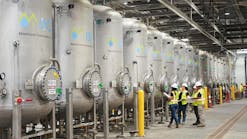The U.S. Environmental Protection Agency (EPA) has announced a $200,000 grant to the Northeast Waste Management Officials’ Association (NEWMOA) to support anaerobic digestion technology in 11 states in the Northeast, New England, and the Mid-Atlantic.
NEWMOA has partnered with the Northeast Recycling Council and Clean and Healthy NY to develop guidance and training designed to enhance engagement and regulatory compliance for anaerobic digestion projects in local communities in Connecticut, Delaware, Maine, Maryland, Massachusetts, New Hampshire, New Jersey, New York, Pennsylvania, Rhode Island, and Vermont.
“This innovative project will help communities in 11 states reduce food waste that could end up in landfills while capturing methane for use, instead of having it go into the atmosphere,” said EPA Regional Administrator Lisa F. Garcia. “Anaerobic digestion is one way to ensure essential nutrients are recirculated into our ecosystems.”
Anaerobic digestion is a process by which microorganisms break down organic materials, such as food scraps, manure, and sewage sludge, in the absence of oxygen. The process produces biogas, which can be captured and used for energy production, and digestate, a nutrient-rich product used for fertilizer. The project funded by the EPA grant will develop solutions to regulatory and other barriers to anaerobic digestion projects while incorporating principles of environmental justice and community engagement.
Anaerobic digestion facilities that process food waste can have environmental and community impacts, including air emissions, odors, truck traffic, and others, which can contribute to disproportionate, cumulative, and adverse impacts on residents. Understanding community interests and concerns from the outset of any project can be critical to successful completion and implementation.
By decreasing the amount of wasted food going to landfills, anaerobic digestion reduces landfill methane emissions, in turn reducing impacts of climate change. Methane traps 28 to 36 times more heat in the atmosphere over a 100-year period than carbon dioxide. Keeping food waste out of landfills by transforming it into fuel or fertilizer can save money and reduce environmental impacts. The grant to NEWMOA is one of 11 EPA is awarding this year to divert food waste from landfills by expanding anaerobic digester capacity nationwide.



